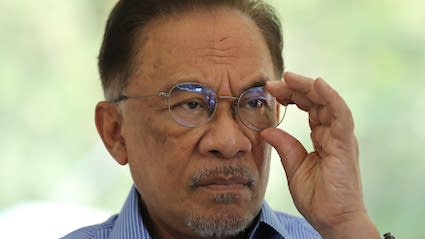Anwar Ibrahim: Malaysia’s Mr. Yesterday the wrong man for tomorrow

Anwar Ibrahim should make way for a new generation of leaders
William Pesek, Nikkei Asian Reveiw
William Pesek is an award-winning Tokyo-based journalist and author of “Japanization: What the World Can Learn from Japan’s Lost Decades.”
Still miffed at missing his shot at Malaysia’s premiership in the 1990s, Anwar Ibrahim reckons his time has finally come.
Really? Given the magnitude of Malaysia’s troubles, and the COVID-19 crisis making things worse, now is the time for steady, transparent and forward-looking leadership, not a blatant power grab by Mr. Yesterday.
The issue is less about the what and the why of Anwar’s quest to displace Prime Minister Muhyiddin Yassin than the when. It may be 2020, but Putrajaya is stuck in a 1990s time warp of its own making. That was when Anwar, then a 50-year-old reformer, captured the world’s imagination. He personified a new generation taking on the cronyism and dysfunction that crashed Southeast Asia. His October 1997 Time magazine cover was headlined: “Anwar and the Future of Asia.”
While the rest of the region grapples with where that future led, Malaysia still fights internecine battles of decades past. And with a cast better fitted to Madame Tussauds wax museum than international magazine covers. The point here is not to sound ageist. At 73, Anwar is a young compared to Mahathir Mohamad, who was 94 in March when Muhyiddin maneuvered him back into retirement. But the political circus in Malaysia is playing out at the worst possible moment. The economy shrank 17.1% between April and June and it is suffering deflation.
Mahathir, remember, came out of retirement in May 2018 to oust the scandal-plagued Najib Razak. Najib’s nine-years in power took a Shakespearean turn as the 1Malaysia Development Berhad state fund generated a bull market in global money-laundering probes. Najib ended up in jail. It’s was a spectacular downfall for the scion of a political dynasty. He is the son of 1970s Prime Minister Abdul Razak Hussein, who crafted the Malay affirmative-action millstone still holding Malaysia back. This New Economic Policy continues to surface some very old problems.
Case in point: Anwar, Mahathir’s pro-Western deputy premier and finance minister in the 1990s. The two had an epic falling out over those fossilized 1970s preferences for the ethnic Malay majority. That meant Chinese and Indian minorities missed out on access to jobs, housing, education and business contracts. It was a recipe for mediocrity in a fast-changing region that repelled investors and fostered corruption.
Anwar wanted to dismantle that apartheid-like matrix; Mahathir said no. Anwar was fired and later arrested on murky charges of corruption and sodomy. At the time, Mahathir courted pariah state status by blaming Jews, particularly George Soros, for the ringgit’s plunge. While Indonesia, South Korea and Thailand repaired financial systems and moved on, Malaysia turned inward. When Mahathir stepped down in 2003, after 22 years in power, his low-key replacement, Abdullah Ahmad Badawi, kept things largely on autopilot.
In 2009, Najib took power pledging to increase competitiveness. Instead, he left a nation covered in crime tape. The billions missing from 1MDB spurred investigations from Singapore to Zurich to Washington. In 2018, when Mahathir ousted Najib in an election, Anwar was again at his side. Anwar now claims he is the one to stabilize Malaysia’s economy — and that he has the votes to end Muhyiddin’s 211-day tenure.
Few see Muhyiddin as an epochal change agent. He does win points for a solid coronavirus response. Malaysia, population 32 million, has fewer than 11,000 official infections. Yet as a reformer, capable of creating a more meritocratic and innovative economy, Muhyiddin has yet to prove himself.
The idea, though, that the ghosts of crises past are what Malaysia needs, circa 2020, seems fanciful. Last week, Anwar highlighted the need for a stable government to steer Malaysia through the pandemic. Yet the bold plans for structural upgrades that were Anwar’s calling card back then have given way to bread-and-butter issues bordering on populism. Short-termism, in other words.
Anwar’s New Malaysia is more vanity project than policy shift. That is worrisome, considering he would inherit an economy performing at its worst since the late 1990s. More ominous, Anwar seems to be cozying up to his former party, the United Malays National Organization. Prior to the last few years of political chaos, UMNO spent six decades in power looking after Malaysia’s dominant ethnic and religious group. Yet so hungry is Anwar for power that he seems willing to rehash the retrograde ideas he fought against in the 90s.
A couple of questions Anwar has yet to answer. One, how is having a third government in little more than six months during a crushing pandemic in anyone’s best interest? Two, why not support a younger leader with less baggage who can focus on moving Malaysia forward? Three, why not push for a general election to let voters decide, not disgruntled lawmakers? Muhyiddin says he is not going anywhere. That sets Malaysia up for fresh squabbles that distract from containing COVID-19, managing swelling government debt and raising its game in a region embracing the future.
That ringing sound? The 90s are calling Anwar, on a hard-line, trying to warn him to stand down. Malaysia needs new ideas and energy, not a bull market in nostalgia.

